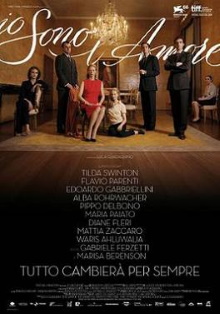
This is an Italian film directed by Luca Guadagnino who was responsible for the excellent and intense Call Me by Your Name. This earlier film is actually the first part of what the director calls a trilogy and not only does it star Tilda Swinton but it appears that the well known Hollywood actress was heavily involved in every stage of the production. Unfortunately while this one is also about an intensely passionate romance, I found it too single-minded in its focus to really like.
Emma is a second generation member of the wealthy Recchi family in Milan. Russian-born, she is now married to Tancredi, eldest on of the family patriarch who founded the textile business that made them all rich. The family gathers one evening to celebrate the patriarch’s birthday and Emma’s son, Edoardo Jr., brings his girlfriend to meet his family. Antonio, a lowly cook, also makes an appearance. He had previously beaten Edoardo in some unnamed race earlier in the day much to everyone’s surprise and wanted to thank him for graciously admitting defeat by bringing a gift. The two become friends and Edoardo briefly introduces his mother to him. Some months later, Emma is having lunch in the restaurant where Antonio works and has a huge reaction. When she runs into him in the street in San Remo where his father owns some land, she feels an impulse to follow him. When he notices her, he offers to take her to his farm and predictably they begin having an affair.
As the film opens with lavish dinner party where we are introduced to a large number of characters all at once, it’s a little difficult to work out at first who the focus is on and where the story is going. There’s a bit of a Downton Abbey vibe as we watch the family members mingle while behind the scenes the many servants bustle to make sure everything runs perfectly. There are subplots aplenty, such as Emma realizing that her daughter is a lesbian, and Edoardo Jr. being at odds with his father over the direction of the firm after the death of the grandfather. But it is only when the affair kicks off between Emma and Antonio that you realize that this is indeed the focus of the entire film and everything else is a sideshow. The scene where Emma eats the food made by Antonio is singularly unlike any other shot in the film with its vivid colors and intense focus. I believe that the director’s intention is indeed to tell you that she falls in love with Antonio then and there just from eating that meal.
The director’s commitment to raw, unbridled passion is something to behold and is what makes him stand out. Every time Emma and Antonio meet, sparks fly as the film practically goes into sensory overload with pure sensuality. Food, music, light, everything goes and the film practically visualizes the sensation of skin on skin contact. The director even goes one step further and embodies the love between Emma and her son in the form of a childhood favorite dish. So when Emma teaches Antonio how to make that dish, Edoardo immediately perceives it as a betrayal. Yet as powerful as Emma’s emotions are, it feels too simple to hang an entire film around. While we get know plenty of details of Emma’s life, we know almost nothing of Antonio’s. Yet that is part of the director’s point that it doesn’t matter. All of Emma’s other ties, to her home and to her family members, pale to nothing in the heat of passion. That’s just a very difficult philosophy of life for me to accept.
All this is to say that I don’t much like this film at all. It’s true that it’s beautiful and well made and there is intelligence and thought put into creating the fictional Recchi family and developing the dynamics of their relationships. So it feels strange and wasteful to me for the director to just declare that all of that doesn’t matter when one is truly in love. Call Me by Your Name is just so much more mature in its outlook with its message that there is a time and place for such passion, but it doesn’t have to rule our whole lives.